|

An apple for the birds.
(*photo credit)
October 1, 2019 Food Attitudes: A Personal Journey
Food issues deserve special reflection; so we give the month of October to a variety of food-related subjects. In doing so we realize just how important food is to our lives and how often those of us with plenty take our food quality and quality for granted. If we are to heal our wounded and food-insecure planet, we must show respect for what we have and how to share it better with those in need. Frankly Americans waste food; we don't eat the right food, and we eat too much of the wrong types; we lack moderation in food intake; we fail to share surplus food, and we are insensitive to the food needs of the hungry. Furthermore, we need to uncover the hidden influences at work in our life's journey -- and that involves fulfilling our nutritional needs.
In the course of the next two months we will look at changing attitudes about food: food reflects changing tastes; we must work for our food; food is a total experience; food is sacred and can be consecrated; food has a political aspect; food must be grown to be appreciated; food must be geared for our needs; and food is a gift for which we should show gratitude.
This discernment considers influences dealing with food availability, cost, safety, as well as personal preferences, peer and community pressure, advertising and promotion by commercial interests, convenience in preparation, and care-giver dictates. At certain times foods are deemed unsafe due to environmental contamination. Here are some reasons for this focus on food:
* Environmental considerations -- Since many foods are bought either out-of-season or originate in distant lands, the cost of shipping these substances can add much to an already overloaded planetary carbon footprint. Some foods are contaminated by pesticides and other chemicals;
* Personal health -- I am in a borderline area with an elevated cholesterol level and difficulty in maintaining my weight at a moderate limit (waist and hip girth should be equal);
* Personal mission and achievements -- This discernment can help others with the same issues; growing one's own food and preparing one's meals are ways of enhancing a person's sense of wellbeing and outlook on life;
* Community nutrition and health -- We live among people who do not have adequate food security or have unbalanced diets through not choosing nutritious foods in reasonable quantities;
* National food safety and energy policy -- The governmental system for safeguarding our food supplies is not working perfectly. Today, a sizeable portion of America's best food producing lands is being diverted to production of ethanol for fuel; and
* Global crisis -- Food is in short supply worldwide and will get scarcer in the upcoming decades with the impending climate change conditions now unfolding.
Prayer: Lord, give us the opportunity to focus on all aspects of food so we can share generously with our needy neighbors.

Fruits of the persimmon, Diospyros virginiana, native Kentucky
tree.
(*photo credit)
October 2, 2019 Food as Divine Blessing
God gives us the bounty of food to be healthy, nourished, and fulfilled in company with others as a social festive event. Food is mentioned in the Scriptures hundreds of times; some have given the actual count as over six hundred. Food was and is always important, and is meant to be part of our human welfare and enjoyment; when considered generally it becomes a special blessing for all of us, and becomes a major component of festive occasions of all peoples from primitive to more civilized groups.
The importance of food in our lives should not be minimized, especially since we in this country are blessed by the abundance of good food as well as high quality products that are shipped at times from great distances and with concern about freshness and safety. When a bad strain of lettuce or eggs appears, a massive undertaking occurs to discover the culprits and to remove any possible contaminated foods from store shelves. Our awareness of safe and fresh food is heightened through consumer watch groups who know full well that contamination may occur and that the regulators are not perfect in finding bad food.
Americans are well aware that our own stricter but still imperfect watchfulness is not shared by all nations and peoples.
To be fair, some nations are better at food safety than our own, for the U.S. is not at the top of the list. But being a big nation, the safety apparatus is fairly successful and very little food poisoning appears considering the vastness of our land. In fact, some will fault our various national, state and local governments for being too fastidious about lifetime sales spans for perishable goods. In fact, some people are so horrified that they practice "dumpster diving," or gathering from the waste bins near grocery stores the most recently deposited out-of-date items to be recycled and reused by people who cannot afford the fruits or cuts of meat that are discarded. This practice demands caution.
Food economics is a learned experience. Learners are able to grasp the three-legged stool of food balance (economics, nutrition and local supply). Food economics involves care in purchase of foods in the best quality and nutritious quantity that is affordable. The buyer looks to locally grown produce where the quality can be more easily determined than for foods grown at a great distance under questionable circumstances. People prefer to balance all three components within their limited food budgets. Under the trying conditions of our times people make choices based in part on their pocketbook. Some must choose between rental payments and eating less, and prefer to be hungry rather than homeless. Food insecurity is not just a foreign phenomenon, but a sizeable number of Americans have to make major choices when it comes to food security.
Prayer: Bless us, O Lord, for these thy gifts that we are about to receive through thy bounty.
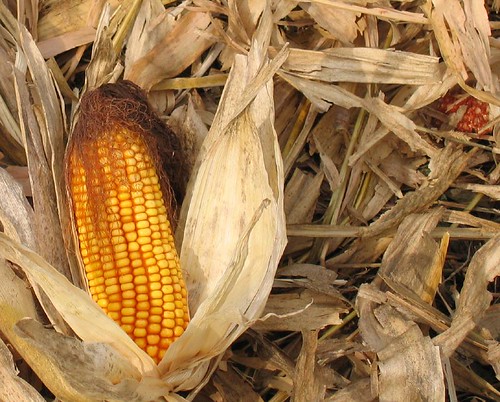
Golden ear of corn. Family farm in Woodford Co., KY.
(*photo credit)
October 3, 2019 Food as Taken for Granted
Do we take plentiful and high quality food for granted and that our food markets will always be stocked? What about another question that comes up frequently enough: "do you like your steak?" When the answer is "left on the cow," the host seems offended, for it is assumed you eat steak on major outings; the required choices are "rare, medium or burnt;" anything beyond the standard reply is truly rare. In fact, it is not just affluent adults who have a food-for-granted attitude; sometimes American food stamp users exhibit similar attitudes. Maybe taking food for granted comes early in life and stays with us. Does it start when we hit the high chair tray with a spoon with the signal, "Bring on the grub!"? Our hunger must be sated right now.
Give us this day our daily bread. We learned the food-related phrase in the Lord's Prayer by rote early. How often in reciting this prayer do we really reflect on what is said? Did we ever know what it would be like not to have access to tomorrow's food today -- and to be radically dependent upon the Lord through food insecurity? Yes, we say our Grace before Meals, but what if daily bread is not accessible by ordinary means? To give a meaningful prayer before eating indicates that we do not take food for granted, and that this bountiful gift is from God, the source of all life-giving processes, including food security.
Few of us go through a lifetime without having some experience when food is not readily available -- a blackout, a car breakdown, being lost on a hiking trip or such. Suddenly food is not right at hand and we face a hunger situation by not being near a refrigerator, a grocery store or even a garden. While hardly noticing it, we have become accustomed to sufficient food in a generous supply for all to have our fill. Let's reflect more deeply: what happens when that single occurrence of hunger becomes a daily occurrence for one billion people suffering from chronic food shortages and insecurity? Something is awry in this world and we feel some responsibility. We must have compassion for our hungry brothers and sisters -- at least in spirit. However, "in spirit" also means doing something about their condition.
In my early years, I did not realize that all people, even in our county and state, do not share that "for granted" comfortable feeling regarding food. This strikes me today when I watch people in the local budget grocery store carefully weigh whether they should take this or that item. Many years ago I noted the fellow in front of me with some potatoes, but unable to pay for his onion with his simple purchase. I motioned the checker that I would foot the bill. Big deal! Food stamps make this a rare occurrence today, but conscientious poor folks watch purchases closely.
Prayer: Lord, teach us to truly see the food that is before us as a bounty that is a gift to be truly thankful for; do not allow us to take this food supply for granted.
Respect Life in All Forms
October is Respect for Life Month. It is fitting that we spend time dealing with needed respect to counter the culture of death and, instead, to celebrate all living creation. Respect includes our basic attitudes in treating others, practices employed to extract and use resources, the way we interact with tame and wild plants and animals, and ordinary daily relations that we have with neighbors, immigrants, unemployed, shut-ins, imprisoned -- even those with whom we harbor any animosity. Life includes all people at whatever their stage of development, as well the respect we show to all of Earth's creatures. Preserving vitality demands respect.
Youthful disrespect depends on the conditions we found ourselves in during early years. Frankly, in young years I did not have a respect for all living things, and that attitude was fostered during World War II; the enemy were killing our servicemen; in our patriotic stance we cheered war films and news reports of bombings of German and Japanese cities. A basic sense of prevailing disrespect filtered down to plants and animals, that is to all except livestock and crops (even tobacco), which were of economic value to our family. In some ways I was pro-life and cheered big families and newborn infants. Still, racial prejudice lingered and had to be confronted and eliminated, a forthright task facing all white people in our neighborhood. Respect had to mature!
Wildlife disrespect has been and remains a major problem far beyond personal realms. Hunting was not part of our agenda except against crows that damaged our green corn crop. Killing small game and doves for sport always bothered me. Even the zoo where caged animals could be observed disturbed my sense of freedom for wildlife. Today, cheetahs could go extinct because so many young and older ones are being snatched and shipped across borders, especially to residences of the Middle East ultra-rich; these fragile animals do not generally survive improper treatment in captivity. The same situation occurs with lions and elephants, beavers and badgers. Certainly the need for protein among poor living near wildland reservations seems an exception, but could be compensated. But the illegal sale of ivory and tiger parts means species threats -- ultimately, impoverishing Earth's plentitude.
Forest disrespect is also a major global issue. Massive lumber operations with no respect for saplings must halt. Selective timber cutting and use of horses or non-damaging equipment can help preserve thriving forests. Do we need the paper products furnished by Southern pine plantations? Think about the vast Amazon region in South America, the lungs of the planet; cutting the forest cover to make grazing land for cattle is a disaster, resulting in destruction of vast expanses and even wildfires that are damaging thousands of square miles of vital forests. In Malaysia and Indonesia, plantations have replaced richly diverse forests to turn palm oil into beauty products.
Human disrespect comes in a variety of ways: uncontested racial attitudes, death penalty in so-called civilized states like our own, refusal to accept refugees who are stateless, tolerating hunger and the terror of food insecurity, allowing the privileged to trample on democratic values of society, so-called mercy killing, and abortion. For some, denying current conditions overlooks those suffering from climate change; for others, an excuse to become inactive allows injustices to persist in a world that ought to know better; and for still a greater number, global problems causes them to escape to their own allurements.
Respect must flourish and be manifested in many ways: inserting kind words, deliberately making gracious gestures, showing facial delight and smiles, entertaining happy thoughts, reflecting on our basic attitudes in everyday life, saying "thank you" frequently, and accepting life's knocks without complaining. Respect is shown in planting trees, halting use of forest products stemming from plantations, demanding that the caged be released, and petitioning for a Green New Deal. Respect is shown when youth hold the door when we elder enter; it includes good will and silence when conversation includes an off-color joke. Respect involves donating to beggars and charitable causes; it allows the bashful to speak and the overlooked to gain notice. Respect is patient while waiting in line; it encourages hospice givers; it appreciates little deeds; it triggers civic action.
Maturing respect can be cultivated with time and comes more easily for certain people. Those of us with a confrontational streak must take special care to cultivate respect. Respect includes increasing gratitude for what was often taken for granted; it slips in with noticing the overlooked in special ways; it includes refraining from noise-making when others need rest. We become more respectful when others do little deeds for us with a smile at the cash register or table waiting. We begin to be aware that respect is lubricant for a socially just society. We start to notice that our own acts of respect can create a ripple effect that extends social and environmental awareness among others. We are conscious that we can cultivate a climate of broadening respect.
A climate of respect is difficult in this age of informality. Some find brashness part of their urban culture; they show that they have contacts on social media and instant connectedness in their quick responses; they confuse quick facts with wisdom; they consider elders as living beyond their allotted time. However, bringing out these rugged edges of today's world and seeking to counter them is all part of the process of reestablishing respect and courtesy in a world that lacks civility. No doubt, a new climate challenges us and calls for a positive attitude; it can be promoted with persistence along with humor and good will. We need to reexamine our daily actions, formal speeches, homilies, deference to the disadvantaged, our care in social media communications, and our general conversation. Maturing respect is truly a challenge, but fragile life in all its forms demands it.
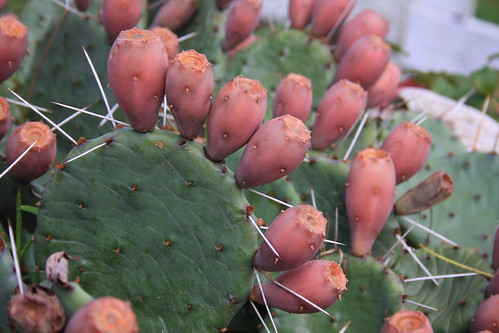
Kentucky's prickly pear cactus, Opuntia humifusa, with edible fruits.
(*photo credit)
October 4, 2019 Food in Simple Games
On the Feast of St. Francis, simplicity is the theme of the day. Perhaps it is a perfect time to talk about food games for youth and also adults. The simplest perhaps is to set up for people two scenarios. In one, we see an eager African family seated around a steaming cornmeal-based main food dish. Each wants to dip in as quickly as possible because hunger drives their eagerness. The meal is simple and filling -- and is enjoyed by all. A second scenario is a table at a smorgasbord containing all sorts of delights. A family is departing after leaving much unfinished food they brought to their table. All leftovers are to be tossed, for the foods have been served. The eaters leave with little comment or sign of enjoyment. Where is the joy of eating?
A special game is one I played somewhere in my long history -- where or when I do not recall. It was a Christian exercise for we had about fifty people, and five got steak dinners with trimmings and forty-five of us unfortunate ones got rice, some with lentil toppings and some without. We were the world's poor. I always hated playing rigid games and so I organized some of us have-nots and we went over and raided the haves and took and redivided the plates so all got a little steak and trimming and the fortunate five got a spoonful of rice as a booby prize. We all laughed but on reflection we realized that this was the Christian thing to do, not simply to know that hungry and forgotten people are out there.
Another game is called "potluck." Have a variety of dishes and find out which ones get eaten up first. In actuality, the simpler foods generally are the last to go and the more exotic ones the first -- but not always, because some people are finicky eaters. However, finicky eaters may avoid wholesome fruit and raw vegetables and go for prepared pastas and meats. Finicky could indicate a rather affluent background, and few who are poor know what this even means, for most foods taste good to the hungry. Have we always thought of food as God's gift?
Why concentrate on food-related games? Really it is because games are the way many of us interrelated with food in the weaning stage and beyond. However, the games continued down through the years in differing ways and degrees of complexity. For some, exotic foods are now almost daily fare, if they have the funds to pay for them. Teasing someone to eat becomes a game; getting them to eat wholesome food is still another and more difficult task. Bribing them with exotic foods is not good for the planet, the eater, or the feeder. Those who expect exotic food for daily sustenance are to be questioned. It reminds us of the runners who brought pagan Romans snow or ice from the distant mountains.
Prayer: Lord, inspire us to be good learners and likewise good teachers. Help us when necessary to focus on the topic of food, and make the plenty and quality subject matter for continued learning.

Yellow crownbeard, Verbesina occidentalis, Mercer Co., KY.
(*photo credit)
October 5, 2019 Food as Ordinary Nourishment
I came from a family known for cooking on both Mama's and Daddy's sides. For a century my maternal Schumacher portion of the family has run a major restaurant at Schonau, Germany, near the French border. They serve meats, vegetable dishes and desserts similar to our foods on the other side of the ocean, but a major difference is that their mushroom dishes are prominent -- not as in this country. French cooking and meat preparation came from both sides of the family because three-quarters of my ancestry was from that noble land. Alsatian cooking is famous in France with a heavy emphasis on pork and sauerkraut and notable desserts and wines.
As a tot, I vividly remember visiting my mother's home place about two miles from our farm. I recall my uncles (Mama's brothers) coming out of the field for "dinner," the mid-day meal. They needed replenishment of energy for the hard farm work ahead and ate a plateful of vast hunks of roasted beef smothered in heavy brown gravy along with ample side orders of large boiled potatoes and whole carrots. My serving came to me with the horror that I would have to finish this mountain of food. Aunt Ruth wondered aloud why I didn't eat my slightly smaller but over-whelming serving. We were to never, ever waste food -- and never was there a food dilemma like what I faced then on vacation: I could not eat more and I could not waste what was on the plate.
A neighbor once said that eating what we do not need is "wasting" -- or perhaps "waisting." To sustain someone requires a certain amount of food; to eat what a growing appetite demands borders on a "waste of" a precious commodity. We read in delight or horror how the Roman orgies included time out to regurgitate stomachs-full of gorged food. Oh my! Unfortunately, with time our stomachs can expand to take in more and more, often beyond what is demanded for keeping healthy. That's a maturing person's caution.
July threshing was when neighbors got together and enjoyed the day of working and talking. They would assist in threshing a field of wheat. The threshing machine arrived the evening before and on the day all local farmers brought teams and wagons -- and enjoyed the day thoroughly. The center of the day was a major meal prepared by Mama and others who came to help. There were mountains of fried chicken (fried in lard) and home-cured ham, mashed new potatoes, gravy, fresh cucumbers with sour cream, sliced tomatoes with onions, green beans cooked with ham, corn pudding, stewed summer apples, rolls, butter and cherry, plum, or blackberry cobbler for dessert. Needless to say, all the threshers had appetites -- whites at the main table and the black folks at the porch table, all enjoying exactly the same food. After that we plunged into hot afternoon work with full stomachs of food.
Prayer: Lord, help us see that food as nourishment is needed to grow the food and to prepare it; give us the grace to see all food as gift for our upkeep and worthy of our special efforts.

Field thistle, Cirsium discolor, native Kentucky wildflower.
(*photo credit)
October 6, 2019 Increase Our Faith
The apostles asked Jesus to increase their faith, and he replied that if their faith was the size of a mustard seed, and they were to say to the sycamore "be uprooted and transplanted into the sea," it would obey them (Luke 17:5). This is reminiscent of the parable of the mustard seed, being a small seed that grows into the "largest of shrubs." One year, one of my mustard plants in the ASPI solar greenhouse burst forth and grew to the ceiling; it made me realize that mustard could get tall. The size of the seed or plant is a reminder that from small beginnings can come great things. This gives us courage in our journey of faith.
God gives us faith, and so we must always be thankful for that gift. We are placed here on Earth at this time like a plant in a flowerpot. We can decide to stay put and look out only for ourselves (so we then become root-bound and that chokes off further quality growth). Or we can learn to share ourselves with others and thus allow the plant to multiply and increase. Jesus even speaks of that transfer as being quite dramatic -- of the mulberry tree uprooted and planted in the sea. By going out to others we grow in faith, for our trust is soon replicated and a miracle of new life appears among all involved.
We are called to realize the power of faith. I have found the passage about the humble servant who comes in from the field and then after a day's work continues by waiting on the master somewhat difficult. But upon reflection, it does appear to be about my duties as a faithful person. Jesus likens our duties to being responsive as that of a servant who says, "We have done what we were obliged to do." The humble response tells us how we are to see our fidelity in a humble way. God gives us energy to do our duty; God makes us the weak instruments that we are and affords us the chance to help transform that weakness by working through the power of the Resurrection. We acknowledge our imperfections while waiting on table; God gives us the opportunity to show through our actions the marvelous divine power working in our world.
Our trust grows through humble work. We do our duties with enthusiasm, i.e., the God within. That means we do so with heart and hands and head, and thus manifest the Trinity within. To wait on table to supply another's food needs requires full use of our heart, hands and head. We respond to God's call by trusting our loving God to work hidden miracles through our instrumentality. We open ourselves to others and thus grow in faith. We are being transformed and replicated in what we encourage others to do and be. Too often we only become aware of our limitations and disheartened by the massive work ahead. How can I help bring loved ones back to faith? Will others assist this work through prayer?
Prayer: Lord, help us grow in faith; stand behind our efforts in assisting others in their journey of faith, even if the concrete results occur after our passing away.

Efficient camouflage, Pandorus Sphinx Moth (Eumorpha pandorus).
(*photo credit)
October 7, 2019 Food as Enjoyment
We gave you a rule when we were with you; not to let anyone have any food if he refused to do any work. (II Thessalonians 3:10)
We always had a full dinner table, and meals were pivotal to our coming together at times during the day to be replenished. We were a family of heavy breakfasts, heavy dinners (at mid-day), and heavy suppers as the sun was going down. We had nutritious food in plentiful supply with fancier foods on special occasions. We produced our own food: meat (mainly pork and chicken and later beef); eggs, dairy products (milk, cream, butter, buttermilk, cottage cheese and even some yellow cheese); vegetables and herbs (tomatoes of various types, cucumbers, green corn, lettuce, radishes, onions, kale, mustard, endive, green peppers, horseradish, parsley, peas, beans and new potatoes); and on occasions peanuts, celery, cantaloupes and watermelons. We gathered blackberries, walnuts and hickory nuts and had apples, pears, peaches, plums, cherries and grapes for pies and cobblers.
Breakfasts were focused on meat (sausage, fried ham or bacon) and eggs, fried potatoes spiced with onions, cereal, and cottage cheese. However this like all meals had some variation. At times we had corn cakes; other times there were biscuits and sausage gravy or pancakes made with wheat flour. Work early in the morning was what gave the breakfast appetite; it launched the day.
Dinners were open to all, because there was plenty to go around. It seems that some visitors timed their unexpected calls just at a major meal time or high noon. I recall that once a year a St. Anthony Messenger salesman came unannounced at noon time -- and said he happened to be passing by. He probably had several hundred such eating places on his three-state itinerary. Whoever visited or worked was invited to partake of our food supply and were invited to visit the cellar full of preserves of all types, something of which my mother was truly proud. This was more than a work of love; considering the summer heat of the kitchen in which these were made, one wonders how she survived, especially since many houses in the South had external kitchens due to the heat generated in summer cooking.
Suppers that followed a hard day's work were also substantial. We ate much and we ate seasonal variety. We had wilted lettuce, radishes, scallions, and dandelions as spring delicacies; fried apples, cucumbers in sour cream and green beans as summer fare; endive and mustard or kale greens in autumn, and things from the canning section in winter such as blackberries, plum preserves and mock mincemeat pie -- along with fresh sausage in patties or boiled smoked sausage casings, the containers made from cleaned hog guts. The total litany of foods shows a determination to be healthy for the hard work, which farming entails. And it was good food.
Prayer: Lord, allow us to enjoy the food, which is your gift.
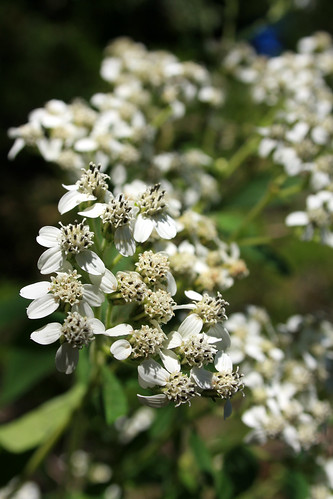
White crownbeard, Verbesina virginica.
(*photo credit)
October 8, 2019 Yom Kippur: The Perpetual Call for Inclusivity
This evening begins the Jewish High Holidays or Day of Atonement, a fast day observed on the 10th day of Tishri. The day is referred to in Leviticus 16:29-34.
This shall be a perpetual law for you. On the tenth day of the seventh month you must fast and refrain from work, the native and the stranger who lives among you. For this is the day on which the rite of atonement shall be performed over you, to purify you. Before Yahweh you will be clean of all your sins. It shall be a sabbath rest for you and you are to fast. This is a perpetual law.
Even if non-Jews do not observe this day, we should honor those who do and discover the spiritual value they find here. All of us ought to see the need to take time and purify ourselves, to fast and to resolve to start life anew. That is a form of moral support so needed in our world today. We pray that atonement already begun will be completed when we all work for at-one-ment, a coming together in communion with the Lord and with our fellow human beings through removing personal barriers that separate us.
Honoring this day is a good way to improve relations with the Jewish community and to partner with them in what they are solemnly called to do and be. Especially since the twentieth century "Holocaust," all people must purge themselves of anti-semitism, and beg God's pardon for the offenses committed in the past against others in the name of religion. But that is not enough. Healing that we seek for this Earth must take on a profound sense of humility at what has transpired in the last century and what beckons to be accomplished in the future.
While saying this, we need to be clear. Not every policy of Israel, the Jewish state, ought to be left unchallenged, especially the blockade of the Gaza Strip and the use of force this year against those activists who seek to break that blockade. A sincere tolerance does not mean we must be silent at all times; it is far better to be up-front about activities we do not condone. We are all one family and so we must engage in challenging dialogue.
Yom Kippur becomes a more global event when we universalize the need for purification; healing of our Earth requires internal purification. This event helps us to see past failings towards our Jewish brothers and sisters, but pointing fingers is no solution. We bear a social responsibility, and so Yom Kippur can become for all of us an interfaith activity. In so doing, we all, Jew and non-Jew alike, can hear God's call that we must all be one -- and that the Jewish people have a perpetual role to play in bringing this about, namely, universal inclusivity of our God and of our human mission.
Prayer: Lord, help us all to find time to fast and make atonement for things done wrong in the past by our community. Help us to assist our Jewish friends to forego exclusivity and to lead this needy world in the quest for oneness through atonement.

Grasses, swaying in autumn breeze.
(*photo credit)
October 9, 2019 Talking Less about Hog-Killing Events
My earliest recollections of killing hogs were that this was a major event at our farm. It came with the first cold weather in November in order to have the pork in time for the holiday season; it was early enough in the week to start to smoke the hams and render the lard. Having now reduced meat consumption I am somewhat ambivalent in even bringing up this reflection. Our practices were a combination of Old World (Alsatian) practices along with rural pioneer Kentucky ones. As a family we did not make sorghum or wine or smoked apples as others did, but we did go all the way by butchering six to eight hogs in this annual event.
The operation was really an adult's work because of heavy lifting: setting up the scalding pan (to clean hair from the hog), and shooting the hogs with a single rifle shot at a space of a dime between the eyes, sticking or bleeding the hog, scraping off hair in scalding water, stringing up the hog on a frame and gutting it, butchering into ham, shoulders, ribs, head, feet and sausage parts (pork chops areas), cutting out the fat, rendering the lard, and making the sausage. The sausage involved Mama's most hated rural task, namely cleaning the intestines for "casings" that held much of the sausage; the meat was salted with some saltpeter added, and Daddy had the art of smoking the meat on a hickory wood fire.
As youngsters we did not take part in many of the hog-killing activities because they occurred on schooldays -- except for the earliest part in the morning before the bus ran (my brothers were crack shots, and no one wanted the hog to "squeal" or not be killed in one shot). We did participate in later afternoon portions of the work. Carl Moore, my chemist friend and mentor at Loyola University in Chicago, was also from a Kentucky farm and his memoirs on hog-killing mention that it took place on Saturdays and that the kids were not allowed to watch the actual killing. We never killed on Saturday because the second day (thus a Sunday with no servile work allowed) involved a major portion of the entire operation. The work of scalding, scraping, hoisting the hog and basic butchering was very hard and required strong muscles.
Food practices certainly have changed during my lifetime. My siblings and cousins who are in to preparing sausage allow professional butchers to do the dirty work of killing and basic butchering. We simply get together and make the sausage with proper spices (fresh garlic and ground sage) along with salt and red and black pepper. The habit of making sausage is a family one that is gradually going out of favor with our aging. Attitudes about food change with time even though the tastes of well prepared meat dishes bring back somewhat sacred memories. We never hunted for meat though others in regions with plentiful wild turkeys, geese, rabbit and deer do. It is a natural way to ensure that the wildlife population is stabilized. Certainly, do eat local food.
Prayer: Lord, help us to move on to a more meatless culture.
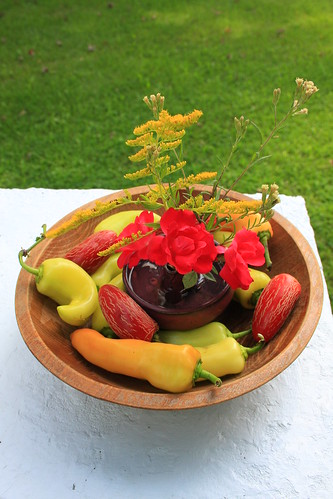
Autumn bouquet.
(*photo credit)
October 10, 2019 Food Production and Land Stewardship?
In my early teen years I would retreat to a cove in the field and pat my trusty gun; I swore that no one would ever take this land from our family. Interestingly enough, the government not only took it away; they filled the cove with dirt; today traffic on the "Double A" highway between Ashland and Alexandria, Kentucky, rumbles right over the spot of my earnest resolve. Little did I realize then that we are here only a short while, and there is nothing permanent about this relationship with our land. In fact, stewardship contains two fundamental components: a gift is involved; our time to use this gift is limited. Yes, land is a gift; we have to use it well and leave it in equal or better shape than when we first came on the scene.
Daddy never allowed an eroding ditch to go unattended. These were filled with coffer dams of rock, fence wire stretched on bare places, and seed sown where needed. We treated wounded land like a human abrasion; immediately mend the wound and apply some healing balm. Our land care was not motivated by the threats from governmental agents; rather this land care was a personal responsibility, for our land/steward relationship was personal and familial. We knew that land fertility can be maintained at a sustainable rate for millennia provided good stewardship practices are always employed. Every spring we spread manure and any agricultural wastes on the fields; we rotated the crops on a regular basis; we kept high quality cover crops on cultivated areas through the winter. We even hired a rock crusher to come every number of years and crush up the limestone rocks (which were scattered all about) into dust that was scattered on the fields in early spring. This made for richer pasture and hay and grain fields -- ultimately higher quality livestock production.
In other countries loss of fertility has been due to poor irrigation techniques or through advancing desert through poor land cover. Parts of the Middle East and Africa have suffered from such tragic conditions of poor management in the past. Disturbing? Yes, to those imbued with land stewardship practices that cannot tolerate topsoil and cropland loss. The amount of precious land for agricultural production is declining. Conservation along with land stewardship is a social, not just a personal, responsibility that was ingrained from youth through conserving parents.
We hear that new methods of agriculture exclude basic tillage for corn and beans. Today soybeans are grown after herbicide treatment, a practice that challenges our preference for reduced use of chemicals on land. The question is whether the agent used is only moderately toxic, the application is handled with care, there are no residual or persistent chemicals, and none is allowed to contaminate the nearby environment. Herbicides are generally less toxic than pesticides that attack nerve systems of fauna.
Prayer: Lord, help us to properly understand our roles as being good stewards of the land on which we have our fleeting home.
Pro-Environment is Pro-Life
Our Earthhealing team has produced a bumper sticker that states the title of this essay, "Pro-Environment Is Pro-Life." This is being distributed to friends and those who give donations and services -- and are willing to post the sticker on their vehicles. The converse "Pro-life is Pro-Environment" is equally true. Some say the first phrase shows an intended audience -- in this case environmentalists. Perhaps that was our hidden but not obvious intention, for we have strived to address divided groups in a public manner. In fact, I belong to both environmental and pro-life groups, and I feel ignored when excluded by strong-willed pro-choice environmentalists or limited pro-lifers. Since the 2012 elections I have worked to unify divided groups and show that being both pro-life and pro-environment is the most consistent social justice position in these troubled times.
Get this sticker! Put it on your vehicle in a noticeable place; remember, it can be seen on highways and in parking lots. This one item tells a non-threatening message in its own way. Often we see a phrase when driving in a half daze, and we allow it to percolate in the back of our minds. Certainly the quick message needs to be clear, draw attention, and be a stimulus to further reflection. Some bumper stickers are cute and get a chuckle; others are serious and demand longer-term thought. It is hard to communicate in phrases, even more so than through a twittering Administration's messages. Creating the unrude is a challenge.
Keep a car clean? Drivers can be finicky about what they attach to their own precious vehicles. Some don't like to "deface" their car with something that will attract attention. In due respect, we don't question those wanting to be public with the least fanfare for fear of attracting cops -- and that includes avoiding stickers of any type not required by law. On the other hand, some appreciate stray messages during routine trips that will trigger a new subject in our tired "roadscape." Then we can ask, shouldn't we try to help others through unsolicited environmental messages? How do we challenge "information overload" at low expense? Doesn't a message of togetherness for divided people cost effort and money? While there's no gimmick, no cute catchword, no bright light shining, still an eye-catching message is needed. Furthermore, messages should not risk the threat of defacement.
This message addresses two audiences: those who are committed environmentalists and yet not pro-life in a narrow sense of anti-abortion as the only issue; and those who are narrowly pro-life and fail to see the incorporation of pro-environment issues and actions as part of the issue of vitality. Often partisan politics enhance seeming differences and play on an urge to be true and effective. We are drawn to unite two opposing camps in a joint effort to save our wounded Earth, where broad collaboration is utterly necessary.
Pro-environmental folks are challenged to see the social dimension of the issue; thus, conflicts of rights often occur and must be confronted as such. To say "social" and yet regard choices of individuals in a libertarian fashion as having a sacred primacy over those of society on the whole can be a stumbling block. Social infers several sides to be considered with respect, something that those committed to a singular issue such as individual's free choice find difficult. Social life includes the raw reality of a panicked individual with an unwanted pregnancy; it includes hospital sufferers seeing little improvement over time.
Individual choices and global collective needs can spark differences. Choice by individuals is a human right that needs to be affirmed. However, individual choices cannot override basic human rights to life of others. Choices are not always absolute; gradation exists when it comes to conflict of rights -- and the following statements will make those in one or other camp irritated: critical concern is when a mother's womb contains the life of another -- and so-called progressives saying "it" lack a respect for life; on the other hand, profiteers who disregard the habitat of the poor for their own privileged anti-environmental actions also lack a pro-life stance.
Pro-life folks must see that a narrow focus weakens the very issue they promote. To speak of the fetus as having a need for protection, and failing to see that plant and animal species are being threatened or exterminated by human greed and thoughtlessness, degrades an authentic pro-life stance. Far better is to consider all forms of life threats (whether to condemned prisoners, to refugees, or to elderly and infirm) as vulnerable and worthy of broad-based protection. At the same time choices cannot be ignored, for free action makes us human and must be championed. In fact, Christians celebrate Mary's choice to bear the Messiah as the greatest choice ever made by a woman.
Life is fragile and demands protection. A duty befalls us and that comes only after mature reflection; we must give special attention to life that can be snuffed out through any form of individualistic action. While God has taken immense care to bring life to this point in evolution, there's no guarantee that it continues considering humans with the power to enhance or kill, to protect and to destroy. Life is a cooperative venture, for forces of destruction are all around and must be countered. Our protective responsibility needs divine assistance.
Life is a divine gift; it is not ours to begin or end, but only to enhance during our brief mortal sojourn. For believers, mortal life is a preparation for eternal life. We are in God's hands and we leave the span to the Almighty. A secular world considers that power includes control of others and even our life span. Respect encompasses life in this most basic form; we do not deserve what we have received nor do we control length of the path taken, only the quality that we give life through love. Vitality is to be honored, protected and enhanced when under attack from secularity and excessive individuality. Yes, affirm life!

An autumn-bloomer, the great blue lobelia, Lobelia siphilitica.
(*photo credit)
October 11, 2019 Limits to Global Food Assistance
The vast Midwest stretches from the Appalachians to the foothills of the Rockies. The fertile Great Plains has been one of the major breadbaskets of the world. Farmers of our country raise the food we eat, with a sizeable quantity of soybeans and grain going to export. Beginning in the late eighteen hundreds and stretching to this day, the United States has always ranked among the five largest grain producers and exporters in the world. We embrace the mystique that we were part of the grain basket of the world. Much of the more level and fertile Plains is in grain and soybeans; much of the more rolling landscape can make fine pastures for grazing cattle and other livestock. This land has produced surpluses, which are destined for a food-short world.
Lend Lease, the Second World War, and the Marshall Plan brought on this growing awareness that we had more than many other countries. Our agriculture became the basis for an opportunity to assist others. The unspoken mandate emerged in the first half of the 20th century to take global responsibility and help furnish products for the world. This goal of food redistribution did not mean we were to give the materials away no questions asked. Yes, farmers were to grow the food, but the taxpayers were to pay farmers because workers deserve their pay. Use taxes wisely.
Farm assistance became a national mandate, and so the farming community in the mid-twentieth century felt closely connected with a global enterprise, namely, saving the hungry of the world. It was our responsibility to do this well and at the same time make a living doing so. For American farmers food is an essential, something that all the hungry have a right to receive. Each was aware of a hungry child in the neighborhood and that this image could be magnified throughout the world. If someone is hungry and surplus is present, then the Cardinal Frings' rule applies -- take from the surplus what is necessary for life. Gleaners from biblical times had a right to the grain fields.
For the farming community social justice was part of life. When people are starving, give them food now and think about making them self-sufficient later. One does not teach tough love to starving people. Is Farm Aid itself always the way to go? Here one might distinguish: all, even Farm Aid can be misused when the money is spent to pay for foodstuffs that will be shipped to areas of the world that could meet local requirements on their own. In such circumstances our assistance should not be foodstuffs but support (seeds, tools, etc.) for the local farmers to grow local crops. Much of the world could supply local needs if sufficiently financed and encouraged with proper local land controls. The unprocessed grain, soybeans and animal products should be primarily part of global commerce, not Farm Aid except in emergencies.
Prayer: Lord, help us to see the limits to direct food assistance, and still in justice to assist those in need to help supply the essential needs of local populations.
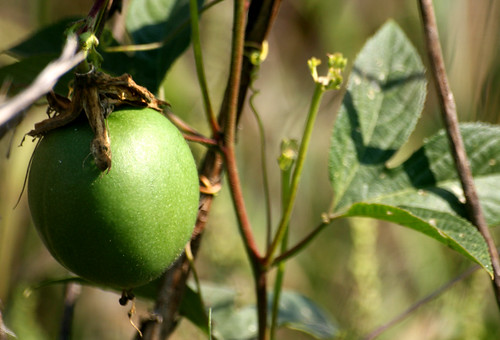
Fruit of the passionflower, Passiflora incarnata.
(*photo credit)
October 12, 2010 Focus on Food-Growing Crops
Our world is limited as to arable space for food-growing purposes. The global focus ought to be on use of land for growing crops that feed people. Today, in developing nations more and more traditional food-growing land is being used for non-agricultural or luxury purposes, some moderately necessary and some not so:
Industrial and support services
Roads and parking facilities for private automobiles
Urban sprawl including individual housing
Tobacco cultivation
Estates with extensive lawns
Golf courses in congested areas
Grainlands diverted to biofuels
Horse farms and racing facilities
Lawn reuse. Some modifications could be effected that could minimize the impacts of these trends. For instance, lawns could be converted to growing fruit trees and garden plots to feed the local population. Just as the thirty million victory gardens proved a godsend for increasing American food supplies during the Second World War, so today a return to victory gardens could make the lawnspace become far more fruitful than the care and resources it takes to maintain a monocultural lawn.
Public transport. Efficient public transportation could replace the congestion and parking space requirements for those using the increasing millions of individual autos. The world is moving in the direction of the perceived convenience of the private vehicle, but at a great cost in resource use as well as the space for traveling, parking, maintaining the private transit system -- unless there be a return to the use of bicycles.
Land zoning requirements could easily do away with the use of valuable land for golf courses, a form of entertainment requiring much conversion of private land for exclusive greenspace. In fact, turning these areas to public parks for congested populations would be a great advantage, for all of us need greenspace to some degree. Large private estates could be zoned into far smaller parcels and thus save the land for agricultural purposes.
Biofuel conversion. Isn't current biofuel production from about 40% of America's corn crop corn another extravagant example of inappropriate land use? The argument of independence from non-renewable energy imports is no longer valid when the U.S. has now become a net exporter. When grain-producing areas are diverted to biofuels it is an environmental liability, for it takes fuel to grow the crops, there's still greenhouse carbon dioxide emissions, and the fuel could be replaced by renewable energy sources (wind, solar, etc.) and electric vehicles.
Prayer: Lord, teach us to see the priority of land uses, so that plentiful food supplies will be available for a hungry world.
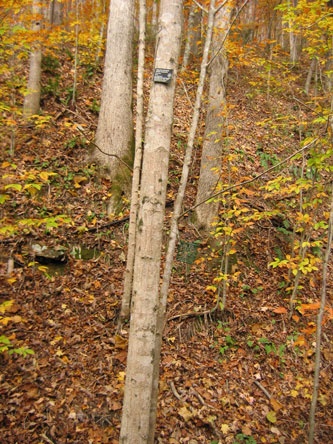
Tree labels at Appalachia - Science in the Public Interest.
(*photo credit)
October 13, 2019 Showing Appreciation for Miracles
There are two ways of living your life
One is as though nothing is a miracle,
The other is as though everything is a miracle
(Albert Einstein)
The story of the healing of ten lepers with only one returning to give thanks (Luke 17:11-19) can be taken in a number of ways.
Showing pity or compassion is the beginning of the miracle. If someone suffers in any way and we recognize that suffering, we have entered more deeply into the miracle of life and come to appreciate wellness all the more. Extending compassion to another is an opening to their world, a sharing of what they have to offer to us through outward expression. We discover a privilege in joining them; through their offering they can appreciate our presence.
Sharing and appreciating little gifts is the stepping stone to an atmosphere of gratitude, a ministry open to everyone. In the story of the ten lepers (Luke 17), at least one person knows where the gift of healing comes from, and this foreigner takes time to return and show a sense of gratitude for what was done. For him, the duty is first to the giver of good gifts and then to the ritual cleansing that would make someone free to travel within the community. Praise God that at least one of the healed returned! We ought not to regard Jesus as stern and demanding, thus expecting the dutiful return of each of the healed. However, giving thanks is our greatest act of freedom as human beings with free will. What greater praise to God than an act of thanks!
Another way of interpreting the reading is one of enthusiastic participation in the glory of creation and re-creation. In this view there is light-heartedness, much as at the Easter episodes. Joy gives rise to being free, and thus the demanded gratitude of the severe mind is not present. "I thought there were ten and only one returned -- and the foreigner." In one part of the disappointment was that faithful believers ought to be the very first to freely give thanks for gifts received.
A little faith goes a long way if we believe it does. This explains a previous reading from Luke where the faith only has to be the size of a mustard seed to work miracles. Here, recognition of big things as well as small in an appreciative manner is part of faith and part of the miracle. The response to the gift of Faith is part of the total faith experience -- "Your faith has saved you." We often think the gift is so great that our participation is unimportant, but that is not the case. God invites us to be participants -- and our free response that seems so trivial is really the grand moment of all creation.
Prayer: Lord, help us to appreciate all your gifts, especially the miracle of life itself and the many blessings that accompany it; thanks for giving us compassionate love to share with others.
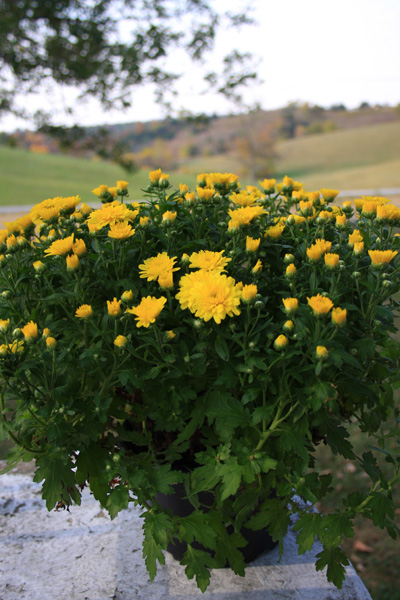
Brilliant yellow mums to greet October's arrival.
(*photo credit)
October 14, 2019 Honor Migrant Farm Workers
You must not molest or oppress the stranger, for you were once foreigners yourselves in the land of Egypt. (Exodus 22:20)
During the Second World War an unemployed worker asked Daddy for some day work. We could hardly afford to hire anyone other than our sole tenant who earned a modest living, house, and garden space. However, Daddy gave him a few days. We were at the dinner table and the poor soul told how much he had paid for a cucumber, and I figured out loud how many minutes it took him at his rate of employment to pay for the humble vegetable. All were shocked at my public arithmetic, but my concern was justice for workers. Luckily, the fellow got better employment the next week -- and we were all relieved. However, the problem has persisted. How can one pay just wages when one cannot afford to pay them? That applied in the 1940s with Appalachian migrant laborers whom we tried to help in our own way, and applies to many Hispanic migrants today.
A more recent story in our parish in this century also speaks about immigrants. Felix was a migrant, a family man, a hard worker and a member of our parish. One Saturday he went to the store to replenish supplies using a friend's truck with which he was unfamiliar. On leaving the parking lot, he stopped at the exit sign and extended the truck too far in the face of ongoing traffic. In backing up he apparently tapped a car just behind him. Not even hearing this, he drove on to the next store. The woman driver in the tapped car was irate that a person of his nationality should "hit and run." She hailed the police and confronted Felix. Felix was bewildered and the next thing he knew he was hauled into court. I begged the woman to drop the charges against Felix, but for a long period she refused while making nasty remarks about immigrants. The case was ultimately dismissed with Felix paying the very minor damage -- but minus much needed money in lost wages.
America has welcomed migrants because we are all strangers and guests at one or other time. America has been an attractive land of opportunity -- and migrants cross and sometimes die in the burning Arizona sands trying to get here. Refugees have a very difficult time as well. Migrants are preyed upon and lured to this country with little in support systems; undocumented workers are at the mercy of employers, so that we can have our cheap food.
Our affordable food prices are thanks to sweaty migrants -- often uninsured, hidden, ill-housed, but deeply wanting a better life for their loved ones. National and international policies are critically needed both to control migration and to be fair and just to all parties concerned. It takes fewer resources to furnish employment for migrants in their land of origin than in the land of destination. Fair working conditions are necessary; this calls for citizen pressure to Congress, for we need fair immigration laws.
Prayer: Lord, help our nation to respect immigrants as valuable resources and key components to our current economy.
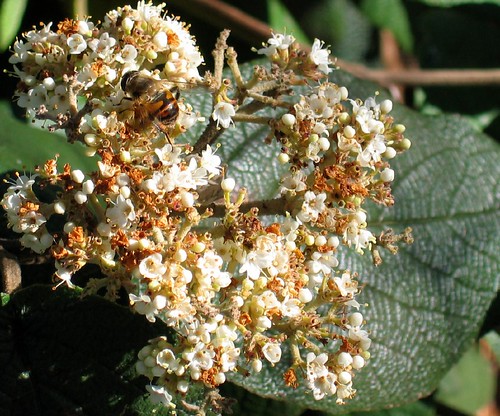
Autumn-blooming viburnum with Syrphid fly.
(*photo credit)
October 15, 2019 Foods and Patriotism
During the Great Depression our family bought few food items -- mainly flour, sugar, salt, vinegar and coffee. About 90% of our food in the 1940s was home-grown. We could not afford to eat out. Even condiments were rarely purchased, for homemade catsup, pickle relish and horseradish garnished meat dishes; baloney and hot dogs were rare treats for summer picnics. The Second World War came after hard Great Depression times and were, for American farmers, a vast improvement -- though it was a little unpatriotic to admit it. The nation developed a "Victory Garden" mentality, that is, grow food for the war effort. Growing one's own food freed the overburdened transport system for weapons' shipments.
I have posted an ad from Life magazine during the war years (to prove that women painted their legs because nylon was all going into parachutes); however, the adjacent ad shows canned beans prominently displayed -- the display choices when canned food brands were prominent. We had few coins and thought it great to have a nickel to go in and buy a Pepsi with ice. We never heard the clink of coins until years later. Even school lunches which cost a dime were too expensive. We took our own (large slabs of country ham on homemade bread with Mama's dill pickles wrapped in wax paper along with an apple). I was ashamed but pleasantly surprised whenever Glenn, a classmate who ate the regular school fare, happened to come to where we rural kids ate. I would share the oversized sandwich with him, for it could never be wasted.
Weekends were times for treats. As mentioned, the war years meant some shortages, but hardly burdensome. We also would buy a twenty-pound block of ice and take it home after Mass. We put the block in an old gunny sack and use the flat side of a dull axe to smash the block into crushed ice, and then we proceeded to make ice cream using the fruit of the season (strawberries, peaches, grapes, etc.). We took turns cranking until it got stiff, and the frozen contents had to be partly removed; churners got "first tastes."
The war years meant rationed meat and sugar. In fact, since Mama canned many preserves, she traded our meat stamps for sugar stamps from urban kinfolks who were heavy meat-eaters and did not enjoy our farm meat supply. Incidentally in the First World War flour was rationed. During the Second Worlds War citrus fruit and bananas were far more limited, for such treats were Christmas fare alone; we ate local fruits in preserves made from the homegrown apples, pears, peaches, plums, grapes and cherries.
We heard radio reports and looked at periodicals depicting the hungry conditions of the Nazi-occupied territories, and came to realize that our country was sending shiploads of foodstuffs to Great Britain -- and other supplies to Russia. Americans had food surpluses that were used in the global war effort.
Prayer: Lord, help us to realize that food is meant to be both enjoyed and shared with others who are hungry at this time.

American chesnut (Castanea dentata), unblighted at this age.
(*photo credit)
October 16, 2019 Food Day Is Every Day
Every year various groups decide to celebrate "Food Day" -- and that will occur again this year in the form of "World Food Day" or more regional or local ones. Actually, today and every day ought to be "food day." Global and local food problems constantly need resolving, both related to food safety and security. Many of us turn aside when pictures of emaciated children appear, but a deepening spirituality calls us to face reality and do something about it. These are our brothers and sisters though never experiencing the satisfaction of a filled stomach. In fact, while food insecurity is very much a global problem, still one-fifth of America's population experiences food insecurity at times.
The challenge is to make the inequality of food production and distribution known to all, so that a sense of sharing takes hold in our world. Schools could be an ideal locus to start a food awareness campaign, but it is not limited here. Church literature and "Lenten Rice Bowls" have an effect on churchgoers, especially the young. If we give our pennies and other change, then someone will have enough in another part of the world. A "catholic" outlook means that with respect to food we take on a global concern -- and this needs to mature throughout our lives. No one is too old to become more aware, for really food excess is the signal for us to consider those who lack what we Americans find as plentiful.
Food Day was really a 1970s creation of which our Center for Science in the Public Interest (CSPI) was an instigator. A number of prominent people were called together about the year 1973. I recall we met in a retreat center in Virginia that was arranged through the director of the America the Beautiful Fund. The meeting included Bishop Gumbleton, a prominent social justice cleric. CSPI did the leg work for that first "Food Day" and it was a highly Washington, DC-focused affair. In a few years this became a national and then a global observance with far more funding and sponsors. The event deserves continued prominence.
Awareness of numerous food problems has gradually developed in more sophisticated ways over time: food sources, irradiation, possibility of botulism, label information, misleading advertising, regional shortages, standard size of servings, fast food choices, cost of essential foods, disposal of outdated foods, and on and on. The terrible effects of inequality that is actually becoming all the more pronounced must motivate us to take these annual events more seriously. With climate change's effects starting to appear, the expectations are that the food insecurity problem will grow in the coming years. Food Day must not be a fad or a chance to enjoy new varieties; rather this should be a serious endeavor to help everyone grow in awareness of a hungry world.
Prayer: Lord, give us the energy and enthusiasm to help give to everyone a portion of our daily bread, so that no one goes hungry and all enjoy a plentitude of higher quality food.
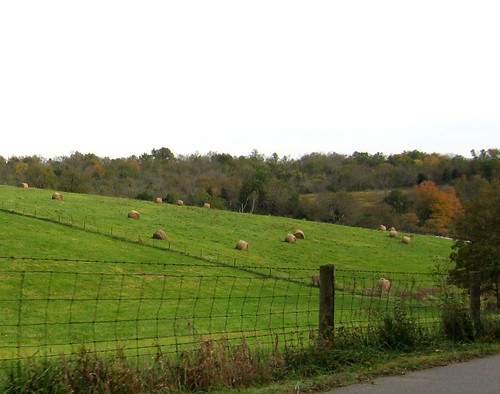
Rural Kentucky in early autumn.
(*photo credit)
October 17, 2019 Food as Festive
There was a wedding in Cana in Galilee. The mother of Jesus was there. (John 2:1)
Absence makes the heart grow fonder. That can be testified by migrants, refugees, world travelers, nest forsakers and those entering a new state of life, all who remember the festive events of their past home life. A change of location results in turmoil, homesickness and in some cases loneliness. Those breaking away look back to festive occasions with yearning hearts; they seek to return if possible on occasions or at least to create an authentic substitute where now residing. Many with a cultural history seek to duplicate sights, sounds, smells, tastes and texture of good food as found in memory.
These festive memories do not mean that the past cannot be substituted in an appealing manner so that the new has equal or even greater merit. Actually, well-prepared food has a possibility of surpassing the past. Preparing food then becomes the bridge building exercise that makes past and present combine in happy memories. Certainly the various food experiences are unique, but they are also part of a total human experience and are to be welcomed. Festive occasions will hopefully continue and be truly fulfilling even while uniquely different from past ones. We do not forget the experiences of the past, for distance in space or time does not take away the memories of certain flavors and tastes. However, the sacrifice in giving up what endeared us to the past is now part of the memory in a current festivity, and can actually enrich today's festive event.
New festive occasions arise as is evidence in the Cana account where Jesus performed his first miracle. Notably the healing and other miracles were to come later; it was a festive occasion when the host was somewhat embarrassed by the lack of wine for the enjoyment of the guests. Jesus approved of festive occasions and so ought we when they arrive at truly unexpected times and places.
I remember Mama sent a fruitcake at Christmas when I was in the Jesuit novitiate with its total tea-totalling atmosphere. After learning about our dry disciplinary conditions in boot training, Mama, according to her habit, amply soaked the fruit cake with a fine grade of Bourbon. In fact, she gave it a double soaking. Beaming with Kentucky pride, I opened the scented package and then remarked to the many standing around, "The poor little cake has fallen down while in the mail." I turned around while all were laughing and proceeded to tell how Mama used Bourbon for candy, mincemeat pie, ice cream (to a smaller degree lest it not freeze), and her hickory nut cake for which she was famous. When, after sharing remarks, I turned back and was shocked to find it had been completely consumed -- with a score of compliments to baker.
Prayer: Lord, give us the grace to always be ready to celebrate food in festive times.
Pro-life is Not a Partisan Issue
Amid the beauty of mid-October colorful leaves we consider that off-year elections are a few weeks away; we realize that partisanship peeps its head amid rampant political posturing. Fundamentally, to be a partisan is not wrong when an authentic but overlooked cause needs to be emphasized. However, when partisanship strengthens supposed divisions for the sake of righteousness it can create long-lasting divisions. Partisans can become excessively doctrinaire; they can politicize a non-partisan issue such as the "Green New Deal," and thus destroy its non-partisan value just when unified action is in high demand.
Some on both sides of the pro-life/pro-choice divide regard "life" and the quality of life as a partisan issue -- but is that really so? In theory, being "for life" is as natural as our innate desire to stay alive and prolong life; in the same manner being pro-choice is part of the innate freedom that makes us human. However, the divisions are deeper than the two words; the real division is over conflict of rights -- though some would say fetuses have no rights -- an "it" and not a "he" or "she." The Roe v. Wade decision in the early 1970s morphed into a two political parties divide to the detriment of issues demanding cooperation.
In recent decades politics have become more divided than at any time since the pre-Civil War slavery issue. Efforts are made to silence Democratic pro-lifers and Republican pro-environmentalists. Even in the 1970s this division was not so apparent. Recall that some of the very significant national environmental legislation occurred during the Republican Nixon Administration. On the other hand, for some to regard the fetus as a "thing" is for believers a form of spiritual blindness and an effrontery to the human person. From a strictly biological position the unborn's growth is a continuum from egg and sperm to living human being. Recall that certain Republicans limit promotion of life to certain aspects of human actions and neglect policies that enhance life of poor people and for plants, animals and Earth herself.
Politics cheapen the struggle to respect life in all its forms. The partisanship has been pressed from two sides. Some strongly pro-feminists champion the efforts to remove any pro-life Democrat from the party even when pro-lifers agree on 90% of issues. One wonders whether for such a purist party is more important than a winning one. A realistic look finds that Trump won due to this pro-life issue in key Midwestern states and Pennsylvania. Candidates desiring to deemphasize pro-life issues are challenged to pronounce a pro-choice stance. Pro-life Democrats feel an antagonism that is crippling to their cause.
Earth is a living planet. Our planet is alive and sensitive to the conditions that can be changed and modified by human technical power and operations. Earth is more than alive; it is our fragile mother; she deserves our love, care and protection. Our modern technical power can enhance life or damage our planet, a challenge and a choice that involves profiteering by the privileged if not controlled by the people. Viewing Earth as living is far more affirmative than to think of solid lifeless rock or Earth's magnetic interior as mere plasma. Understanding the recent geological knowledge of movements of the planet, including earthquake zones and drifting continents, gives a sense of planetary vitality. Earth appreciates enhancement and suffers from misdeeds.
Care for Earth is a moral issue. Some do not like to acknowledge personal nor social sin; they deny the current global conditions because they cannot face their own imperfections whether individual or collective. We must respect Earth, for that is part of our being authentically human. We must show compassion and take offense at Big (fossil fuel) Energy's pursuit of profits that can lead to catastrophic ecocide. This right to absolute privilege and property can't go uncontested; that right is in conflict with the right to life that encompasses Earth and all her inhabitants. Amazingly, the struggle to retain property in the face of threats to Earth's vitality makes this a rights conflict issue.
Care for human beings is a moral issue. This is continuation of the battle over the morality of slavery, for many thought if they treated property civilly that would be sufficient to justify ownership. No, a slave is essentially a human person and economic ownership by another is not sufficient to deny the inherent freedom of that person; property that affects the common good should be a concern of all, not privileged individual property "owners." Furthermore, in the beginning of life the fetus is not owned but must be cared for by another even when that person is birth mother. Difficulty arises in this conflict of rights; mothers have sole care for the other at first, and their choices are paramount to the success of that protection. However, as life advances that care and protection passes to the entire community -- even before birth. Right to life of a dying person is more difficult; this person deserves comfort and hospice care. The individual's choice to shorten life has insurance companies' blessings, but it ignores value of the spiritual dynamics of suffering and compassion.
Spiritual versus secular views are at stake. To be silent when Earth is threatened by human greed is reprehensible; to be silent when abortion is championed is equally so. The believer must speak in an environmentally sensitive manner for the sake of planet's (and our own) vitality. To be silent when the defense of the fetus or the elderly or the condemned to die is threatened is a moral challenge; all demand spiritual insight and compassion from and to all parties. This is not easy when spiritual values are denied by a secular world of either political party. We risk losing fellowship with others by championing a more authentically progressive stance in being pro-environment and pro-life. However, such may risk our genuine efforts to attain the greater common good and successful global collaborative efforts. To speak out makes us more aware that our efforts will not be in vain, if we truly believe we have the power to succeed. In God we trust!

Double-crested cormorant, Phalacrocorax auritus, near Cadiz, KY.
(*photo credit)
October 18, 2019 Eating Food as a Total Experience
We look for any excuse to celebrate and eat. This occurs at formal banquets, club lunches, church potluck, pig roasts, commercial buffets, social breakfasts, and on and on. We gather and share our lives with others in a total atmosphere of food -- and generally the associated sounds, sights, feelings, smells and tastes all add to the ambiance. The food-consuming event becomes a total experience -- and, as we began to mature, this experience became more evident though we seldom ever express it, for fear of being considered overly enthralled by good food.
People who are socially inclined like the experience of celebrating, and the meal is the natural opportunity to indulge. When we get along with certain people, we find more of an inclination to gather and enjoy each other. Liturgically, the Eucharist is the ideal setting to celebrate the "work of the people." Gradually as I came to understand religious services better, assembling to celebrate made much more sense, for in gathering we come to see our needs for and with others. Really, the experience is both in the food and the gathering with special attention given to make the occasion a festive one through music and a sense of togetherness. In secular feasts much depends on preparing appetizers, main courses, and desserts.
No doubt, the preparation of festive foods of all types fills the food history and recipe books, and these have their special value for those preparing for special events using a ritual of certain foods cooked in a special manner for the benefit of "recipe" people. This procedure goes against those of us who desire to create new foods and tastes every day and not just on rare occasions. How about a new soup or salad or new use of peanuts or apples every day of the year? It can be done (see appended listings for 365 soups or salads). Certainly there are two ways of experiencing foods -- new ways or repetition of celebrated older ways according to a specific ritual.
My brother Charlie, the apple-grower, bites into one of his favorite "gold rush" and explains that most fruits do not give the total experience of eating. He would probably say that a banana is eaten silently, whereas there is a crunch with a good firm juicy apple. Certainly fruits produce different experiences, some of which capture the imagination better than others. Granted the sound of a crunching apple, its subtle smell, the texture of the material in the mouth, all of these have an effect that accompanies the customary sight and taste. Rather than trying to contrast different fruits, it would be better to emphasize their total unique experience and enjoy each in turn.
Prayer: Lord, give us an awareness of the goodness of your bounty and to appreciate it in as many ways as possible. We need not be gourmets nor ungrateful boorish eaters; with time we learn to savor good food even when simple, and to share this with others.

Chilly morning sunrise. Barren Co., KY.
(*photo credit)
October 19, 2019 The Sounds that Accompany Food
Our foods do not speak but preparing them, eating and digesting them, cleaning up after, and making comments about them are all expressive in some fashion. The sounds of food include:
Creaking sound of corn leaves opening on moist night
Humming of pollinators as they move among blossoms
Thudding of pears or apples falling to the ground
Clanging of the dinner bell at rural farmsteads
Grumbling in one's stomach on approaching a laden feast
Clinking on china for silence and assembling at table
Praying a "gravy chilling" oration
Sizzling of chicken in a skillet of hot grease
Crunching of someone biting into a juicy apple
Slurping on a dripping ice cream cone
Chomping on potato chips
Chewing on a cud by a contented cow
Soundings after eating beans without complementary protein
Singing of a happy cook or baker
Cracking of peanuts-in-the-shell
Prying open clam shells and shucking clams
Splattering of baby food across the floor
Biting into buttered and salted corn-on-the-cob
Clinking of a pan of hot bread just out of the oven
Tinkling of milk from goat or cow into an empty pail
Conversing while consuming food
Guzzling down a drink after running several laps
Sipping a cup of coffee or tea
Crunching of a chocolate chip cookie between teeth
Sighing after tasting one's favorite dessert
Calling a breakfast order in a fast food restaurant
Crackling of cereal nuggets when the milk strikes
Tearing off the wrapper of a candy bar
Excusing oneself to get to the condiments
Talking with one's mouth full
Explicating when the dish is too hot -- or spilled
Slicing sound of the carving knife in the roast
Ladling the spaghetti sauce on the pasta
Splashing of the veggies in the cooking kettle
Smashing of the crackers in the soup
Sharing a pretzel between friends
Dicing cheese on a cutting board
Washing dishes after the feast
Digging in by a hungry mob at a loaded table
Shoving back the empty plate and belching
Thanking and applauding the cook
Shoving the leftovers in the refrigerator
Popping popcorn or cranberries coming to boil
Smacking of lips
Prayer: Lord, help us listen in gratitude; Foods don't speak but growers, porters, cooks, servers, consumers and cleaners do.

Common Buckeye, Junonia coenia, on goldenrods.
(*photo credit)
October 20, 2019 Bread for the World Sunday
When the Son of Man comes, will he find faith on earth?
(Luke 18: 1-8)
The parables of Luke are rare jewels that shine in different ways and call us to reflect upon them in our personal lives. Here is the conflict between a hard-hearted judge who does not fear God or respect any human being and a persistent nagging widow who threatens him. The battle is won by the bothersome lady because the judge wants her to go on. And what about the third unpleasant character, the one damaging the widow in some way?
A number of years back, I recall a persistent widow who insisted U.S. House of Representatives member stay in a possibly late-running legislative hearing to know how her road had been destroyed by a coal company. They sat back down at her insistence. Persistence pays off for such people; a loving God is all the more willing to listen and be with us in times of troubles. We too are to be persistent in how we approach the Lord in our requests. This parable is partly new and yet is a continuation of the faith discussions of the past three Sundays where incidents related to Lazarus (closeness of the poor and our need for sensitivity), the faithful laboring servant, the gratitude for gifts given by the healed Leper, and now this widow. Amazingly, this sequence in Luke is a journey of faith, our road to faith looked at from the side of responsiveness, fidelity, gratitude and now persistence. All are characteristics which need to be emphasized and reflected upon during our daily meditations.
Whether or not I truly know what I need, do I still pray with confidence that my prayer will be answered? We know that God always answers our prayers. Are we willing to continue to pray, trusting that God is answering our petitions now or very soon? Shouldn't we pray that we hear and understand the answers?
And do we have faith that God is a ready and fair judge who acts in sufficient time for our hopes to be realized? The Almighty is not overcome by other cares and concerns; our pleas are heard.
In order for our faith to grow well with sensitivity and gratitude, we need to pray always. Perhaps this is the Sunday more than others in autumn time when we examine our prayer life in greater detail with reference to our essential needs. Are we clear about what we are praying for and give some time each day to God? As fellow wayfarers, are we sensitive to those who are discouraged? Do we have a friend to whom we can talk about our journey of faith? Do we pray for others who hurt in some way and especially those in need of adequate nutritious food? A journey does not mean an easy ride; it can be arduous and can require effort and endurance. Do we understand this and trust that God will give us the strength to carry on through all kinds of difficulties? Do we have faith that world problems will be solved to benefit all especially the poor?
Prayer: Lord, inspire us to continue to pray always.
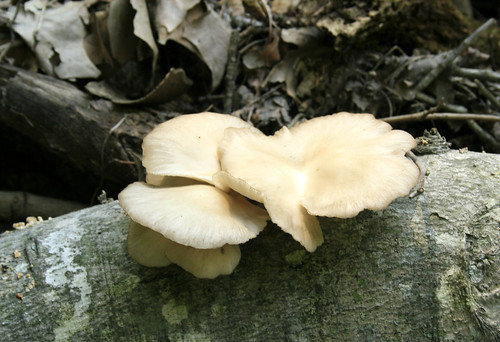
Appearance after October rains.
(*photo credit)
October 21, 2019 The Four Marks of a Good Cook
There are an analogous four marks of cooking, just as there are four marks of the Church as mentioned at the end of the Nicene Creed. Here the "Culinary Creed" may be amended, modified, changed, contested or neglected but I can attest that I know good cooking by smell and taste and looks and feel -- and that means an experienced cook is entitled to being called "good."
A good cook is number one. A good cook goes beyond the recipe of another and becomes quite creative in her or his own right. A certain self-confidence pervades her or his kitchen, and this translates into the prepared specialty in every way. The pride of the cook is in the taste, smell, look and texture -- as well as the sounds of affirmation for the fortunate partakers of the repast.
A good cook is wholly dedicated, not necessarily "holy" at this moment, but moving in that direction. Preparing food can become messy at times, and a cuss word may slip from the lips from the best of cooks. Though imperfect, they strive for the perfection of knowing that their happiness is shared with those who like their cooking.
A good cook is universal -- part of a living community of cooks worldwide. One is not just a good cook of a single dish, for even non-cooks can fry hamburger or boil eggs. Only good cooks have integrity, and they share a global sister- and brotherhood.
A good cook gained from past ages. There is a tradition that can be traced from parent or granny or beyond. Culture and cooking go hand-in-hand, and so the good cook realizes that she or he is carrying on something precious, whether how to make a good pie or a tasty main dish. The hope is that others will catch the spirit and continue good cooking that is either traditional or modern.
--------------------
Excuses for not being a good cook:
I eat because I am hungry and then go on to other things;
It is more convenient to eat out or at another's table;
I like less cooking and more servings of raw fruits,
vegetables, nuts, berries and whole grain cereals (at least
I warm the rolled oats);
My fancy cooking is put off to another day;
I want to stay humble and remain a poor cook;
If you don't like the heat, stay out of any kitchen;
I prefer to compliment good cooks rather than cook;
I'm too lazy to try, and too cheap to buy ingredients;
I'm always changing the recipe; and
I confuse the cinnamon with the chili powder.
Prayer: Lord, help us to appreciate those who serve us.

Thanksgiving Letter 2019
Once each year we extend special thanks for your much appreciated generosity and seek your continued support. In this Thanksgiving season please remember us again; 2020 will be critical in the battle to curb climate change and accept the radical personal and governmental changes needed to save our threatened planet. If you are like me, you have many requests for aid, but please remember that few others do so much with so little resources as does our Earthhealing team. (Click here to continue reading...)

Red Milkweed Beetle, Tetraopes tetraopthalmus, enjoying a favored plant.
(*photo credit)
October 22, 2019 The Taste of Good Food
Some people have a more discerning sense of taste than do others. Furthermore, for some of us our ability to taste decreases in time, so while we appreciate texture of food the particular tastes slacken with aging. Food tastes can involve discriminating good tastes that are objective and considering tastes that we personally like that are somewhat subjective. Food tastes certainly straddle the objective and subjective. Those of us who were taught to enjoy all types of food were more universal in our varieties; we pity those who are quite limited in what they like or dislike. The food universalist looks down on the finicky ones as being somewhat boorish. Can't they learn to like more things? Perhaps they can be like me and despise castor oil.
The variety of food tastes can expand in our middle years, but that may decline when our taste buds become aged. At the start we take food not by choice of taste but because we are hungry, though some may have the luxury to make demands for only certain foods to fill the belly. However with time and through learned experiences, we are able to choose what tastes we like and even what we dislike. With time we become more discerning about our tastes; these come especially when the peer group expands, and we associate with others who regard a food as exquisite and costly. So we accept that a particular delicacy is good tasting because others say so.
Some smack their lips at certain foods and anticipate the coming glory of that first bite. Perhaps that can be a little overdone but those with special tastes can make an issue of it. Actually like smells from the past, certain tastes can bring back memories, and so part of the brain devoted to smell must be circuited in some rather complex way. After a while we fail to recall who introduced us to a new taste. Some recall the first time we ate an olive or oyster on the half shell. The fact others really like this food makes it all the more appealing and so we are convinced as to like certain things. I am closer to being the "kind of sewer" rather than connoisseur and prefer the wide spectrum of food tastes rather than the depths of each item.
A Litany of Food Tastes might be a good exercise when stuck in traffic and hungering for food: sweet, sour, bitter, insipid, rosy, luscious, nasty, tempting, mouth-watering, etc. Everybody's taste is different, and so trying to favor one or other is beyond the realm of the aesthetic. Some have rigid routines in eating, and it makes us wonder how much variety of tastes enters their lives. Didn't Gandhi stay with a simple diet of goat yogurt? Some do not want to vary their foods or tastes -- and some do not regard variety as important at all. However, a quality of life makes some variation in flavors worthy of consideration. It makes certain days run-of-the-mill and some days special and festive.
Prayer: Thank you Lord, for the gift of taste; help us to expand our experience to include all that is worth consuming.
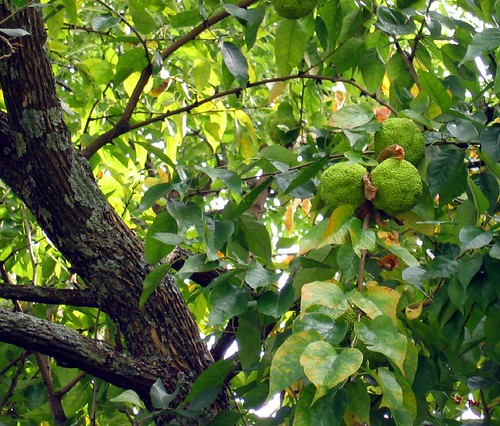
Osage orange, Maclura pomifera, used traditionally as "living fences."
(*photo credit)
October 23, 2019 The Scent of Good Food
The simple sense of smell is far more complex than at first imagined; it turns us on or off without much rational thought involved. A good-food aroma makes our mouth water and elicits the desire to partake of the anticipated repast. Yes, and one must be aware that scents are powerful for triggering the brain and recalling people to good or bad previous circumstances. To complicate the matter further we know that some people have a weak sense of smell; we know that some powerful odors (including room "deodorizers") are able to overpower and mask others and drive some to an upset stomach; we know that some scents linger and actually make unpleasant an appetizing dish about to be served (some fish preparations). The sense of smell can do tricks on us, for we human beings have very weak odor detectors in contrast to dogs and some other creatures who can distinguish one of us individual people from another.
Favorite food smells may be pleasant in the mind and nose of the beholder and gourmet. We must always remember scents are associations, involving the love and care of the food preparer(s). In my mind's nose I can smell the pleasant fragrances of --
Fermenting sauerkraut
Frying chicken
Steaming hot pancakes
French fries
Opened jar of dill pickles
Just roasted coffee
Bubbling cobbler right out of the oven.
Hickory nut cake with a dash of bourbon
Sizzling garlic-flavored sausage
Cooled cucumbers with onions in sour cream
Hot peppered potato soup
Dandelions wilted in bacon grease
Freshly sliced watermelon.
But to be sure not all smells are welcome; I can tolerate the scent coming from boiling water rinses of poke shoots and leaves, even though the "poke salad" is delicious when garnished with margarine, soy sauce, and a touch of hot sauce.
Some odors are noxious to the broader range of people and thus are deemed pollutants (e.g., hog farms and paper mills). Some odors are the warning that the pollutant (e.g., hydrogen sulfide) can be highly toxic, and so odor-detection becomes an avoidance mechanism. We seek to sort through and savor the pleasant aromas and enjoy them as part of a higher quality of life. At times, we detect and reject the toxic odors that warn us of harm.
Prayer: Lord, help us come to authentic healing of ourselves and our planet; you gave us a nose to detect the various odors which are to be accepted or rejected. Thank you for this faculty.
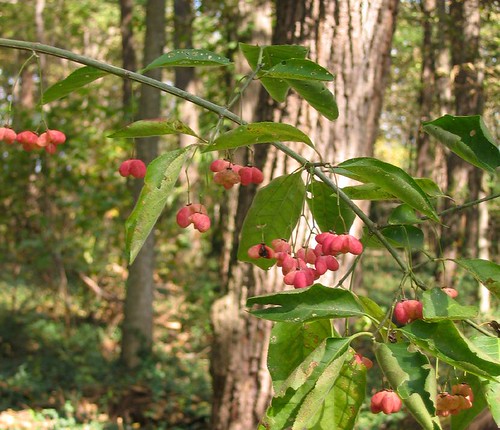
Eastern wahoo, Euonymus atropurpureus.
(*photo credit)
October 24, 2019 Food as Gift to Celebrate
On the most elementary level, we celebrate the gifts we receive and the givers of the gifts. We always gain insight when we see grateful people, especially those who are elderly or are being forced to be committed to a senior citizens home, or to give up the driving license, or to accept hospice at the final stage of life's journey. In one sense the occasion may be filled with shocking reality of immobility or impending illness and death; in another way, it is the reality of knowing that all gifts are from God and all this world's gifts are temporary. We celebrate each birthday -- even those that mean we may be approaching the end of mortal life. We celebrate weddings even though we suspect that there will be bad times as well as good ones. We celebrate graduations even when the graduate does not have a clear understanding of what is in store for her or him.
Gifts achieved are what ought to be celebrated in any sacred liturgy or secular event. It is easy to celebrate the past, but it becomes somewhat problematic to celebrate an anticipated future event before it happens. What we all have to see is that the food associated with the celebration is itself a gift already acquired and now is a bridge to the future. Certainly the celebration of food gifts is part of "liturgy" or the work of human hands. The celebration is a memorial of what has been achieved. However, part of celebration is that we energize and make ourselves more ready for what is to come. Nonetheless we celebrate and rightly so, for life achievements are gifts worthy of celebration.
Yes, the world is in a mess, but we do not suspend the celebratory mood just because some things do not go right. In fact, an opportunity at the time of an extreme event (earthquake, wildfire or volcano eruption) is the perfect time to understand how much the gift of survival and life means to all. Coming together for mutual growth and encouragement is really a time to consider that our enduring faith even in hard and messy times is itself a gift worth celebrating. We hope that this spirit continues and thus we celebrate that it is gift given to this moment to pause and thank God for being here. We trust that God will see us through.
Banquets of all sorts are cherished. Thus we need a special event once a week in which people can celebrate with song, prayer, flowers, and uplifting talks and homilies. Yes, formal occasions are needed to help punctuate lives, and our giving ourselves to them means that we can share in others' good times. In other words, gatherings of all sorts, sacred or secular, picnics or banquets, lunches or dinners, coffee breaks or pauses, all can have a celebratory mood that encourages us to continue on the way.
And food is the material bridge of this togetherness, the glue that holds us together.
Prayer: Lord, teach us to celebrate our calling at this time to help repair and rebuild the wounded world -- and to celebrate our calling.
Enhance Environment by Affirming Life
The difficult task of achieving global collaboration deserves further elaboration. During this month of "respect for life" some may object to being simultaneously pro-life and pro-environment. Their comments are always welcome, for difficult subjects should encourage discussion. Through Pope Francis' insights we are aware that affirming creation has a greater productive role to play than focusing on harm through misdeeds -- an original sin approach to climate change. By focusing positively we extend an invitation to partisan groups to collaborate in saving our wounded Earth.
Affirm environmental causes. Concerned environmentalists are committed to extending an awareness of the critical issues related to climate change to others, especially those who are misled by Big Energy profiteers. A growing number of concerned people in the community of nations realize that collaboration is paramount to successful global environmental efforts and individual efforts apart from others have limited value. Also we are aware that the immense global challenge must occur, lest the poor will suffer in the decades to come through drastic effects of flooding and extreme weather conditions. We extend a broad invitation to all wavering deniers to join collaborative efforts; all the while we must control terrorists who have lost all hope of cooperative efforts.
Affirm pro-life causes. Concerned pro-life folks are likewise committed to ending all forms of life-threatening practices, whether to fetuses in the womb or elderly on hospice beds. Life is precious and deserving of our protective efforts. Some mistakenly regard a narrow focus on specific issues as championing their cause, but does it not weaken collaborative efforts urgently needed today? Intensity of some can lead to attacks on abortion clinics or threats to abortionists -- and cheapen a noble cause. Rather, all pro-lifers must expand their tents of concern to all vulnerable creatures and thus help break down current barriers of division.
Affirm extensive life. To focus on one issue certainly gives an emphasis, and that has value when under direct assault; any worthwhile issue must be defended when others regard it as old-fashioned or worthless. The pro-lifer who narrowly focuses on the inalienable right of the unborn calls for an amendment to our U.S. Constitution. In a more enlightened and less partisan manner the rights of the unborn are championed as an essential part of social justice. Certainly, attacking state legislation that allows for abortion to the day of birth is gross, especially since viability now extends through ordinary medical practice well into the pregnancy. Some say "unprogressive;" some say "murder."
Affirm social justice. Environmentally speaking, the poor are the first to be hurt when living too close to polluting facilities. The poor are the first to be flooded during more frequent severe weather events; they are devastated when their humble habitats are ruined by wildfires and their small farms damaged by drought. The poor are the least able to escape the ravages of an impending catastrophe, if action is not taken forthrightly to move from a fossil fuel to a renewable economy. Social justice extends to all the vulnerable whether with changing climate or the aggressive choices of others. Sacredness of life is to be honored whether it is the threatened plant and animal species or the human in the womb. To overlook the vulnerable is to break social/environmental bonds.
Affirm global renewal. Never before has the challenge been so great, and never more the opportunity for a grand gesture of cooperation among the community of nations; likewise, never has catastrophe loomed so prominently as in the next decade. Our current Administration refuses to be engaged and thus is preparing to commit a crime against humanity. The question is life or death, right or wrong; never have the choices been so stark. The call is for all people of good will to hasten the establishment of a renewable energy economy and to do so as rapidly as possible. When trust breaks down the collaborative efforts are weakened and all forms of abuse fray the threads that hold us together.
Look into ourselves! Where does each of us stand as agents of change? Do we see ourselves as protectors of the glory of creation, a fragile and easily damaged creation? Are we able to do more than tip-toe about threatened creation, or are we willing to confront profiteers who would risk ecocide for continuation of their own wealth accumulation? Are we able to be compassionate to suffering creation while at the same time energized by a holy anger as to what has and is going wrong? Can we mercifully confront deniers of climate change and deniers of the rights of the unborn?
Affirm unitive efforts as good. Will the U.S. help initiate global collaboration and assume some of the costs associated? If we see all creatures in the words of St. Bonaventure as words of God, then it becomes important to see their beauty, complexity and very existence as worthy of a loving and merciful God. The power we possess to do harmful deeds is the power we have to save our threatened world. By affirming togetherness we initiate actions of a collaborative nature. Let's honor life in all its forms, in every creature, in the efforts to safeguard natural habitats, save tropical forests, preserve coral reefs, maintain wildlife reservations, encourage bringing unborn to term, and give worth and dignity to those struggling at end of life.
Affirm a joint struggle for compassion. Global collaboration in an effort to save our wounded Earth is a massive undertaking, the dimensions of which have never been tried before. Success is uncertain but the consequences of inaction is dire and could lead to a catastrophe that would displace tens of millions of the very poor on this Earth. Let's show compassion to the young woman who is confronted with bringing an infant into the world. Let's also show compassion for a coal miner being displaced by renewable energy applications. Here respect must turn to compassion, the merciful handmaid of a renewed Earth. To suffer with others eases the movement into a new unity needed for building a renewed Earth.

Purple coneflower, Echinacea purpurea
(*photo credit)
October 25, 2019 Food as Sacred
I am the bread of life. (John 6:36)
Christians recall the saving deeds of Christ, remember the pledge of future glory, and become nourished with food to sustain us in the troubled present moment. Our Sacred Liturgy contains an "Offertory" of bread and wine, the work of human hands; it includes a "Consecration" in which believers hold that these elements are transformed into the Body and Blood of Christ. Now the Calvary event transcends space and time and we are witnesses to and participants in this event at Mass. The offered gifts are transformed and then received in the "Communion" portion of the Service. We become what we eat -- and if we eat spiritual food worthily, we are able to serve God through loving service of our needy neighbor. Food is bridge between the sacred and the profane.
"Do this in remembrance of me." The Liturgy extends the passion, death and resurrection of the Lord in space and time. The "Breaking of the Bread" (Acts 2:42; Luke 24:21) is a recall, a remembrance, a transcending event and presence of what occurred two thousand years ago and is now in current space and time; "there and then" becomes HERE and NOW. A Holy Land is now extended to an entire Earth; Calvary is today. We are no longer mere spectators of an historic event; we are participants in a cooperative endeavor as members of the Body of Christ. From a past history of apostolic succession involving the laying on of hands, the ordained priest consecrates bread and wine into Christ's Body and Blood.
Cosmic Mystery of future glory: Teilhard de Chardin had a vision of Christ's body in the entire universe as he celebrated Mass at the altar of Earth. John Paul II speaks of a Cosmic Act that unites Heaven and Earth "permeating all creation." Something is coming to be for believers; the Kingdom comes and a future promise is occurring in our present world. The unfolding mystery energizes us to carry on, to believe in a meaningful future and to act as catalysts to make the future, to "look forward to the day of God and speed its coming." (II Peter 3:12)
Nourishment is needed to serve the Lord and so we participate in a meal. We are unable to fully act without food that is "Godself," nothing less. A mere symbolic food would simply be a recall of past events; a future hopeful horizon is not enough to sustain us in the present. Nothing will suffice except food, the bond of Charity, the Lord's Body. In this paschal banquet we are empowered with the risen Lord, renewed with a promise of ultimate glory, and energized by actual food that is Christ's person, a gift par excellence, the Sacrament of Sacraments. "If you do not eat the flesh of the Son of Man and drink his blood, you will not have life in you." (John 6:53) Just as St. Athanasius reasoned that only a Christ, who is God, could redeem and save, so as participants in the saving act of Christ, only those nourished by divine food can so act.
Prayer: Lord, help our unbelief and inspire us to believe.

Monarch enjoying October goldenrod.
(*photo credit)
October 26, 2019 Worthy Communion when Neighbors Are Hungry?
This is a very vexing question and deserving of deep reflection. It is not a new one but as old as the Church; it was asked in plain language by several of the early Fathers of the Church. If one would look outside the door and see the hungry gathered for some scraps and then go in with splendor and forgetfulness and take part in a Eucharist, then one can understand why the question is asked. But is the local scene the only place we find our neighbor? The answer as to who is my neighbor may be more perplexing through expanded social media and the sweep of our areas of awareness to the entire suffering planet.
We all seek to take the Food from Heaven or Eucharist with a certain degree of worthiness -- and we attempt to purify ourselves through confession when we experience being totally unworthy. We undertake a confession of faults at the start of each Liturgy to make us more worthy. In fact, we are never fully worthy and thus we say "Lord, I am not worthy" before receiving Communion. So a general spirit prevails of our own need for God to make us more and more worthy through divine mercy and generosity and our response.
A sense of neighborhood is certainly growing when we experience through Internet and television others who are needy though at a great distance from us. Our age is ever more mindful that our neighbors are many doors away but still accessible through the technological innovations. They are present to us in ways that previous generations living long distances away never visualized. Through modern communications these distant people come to our door begging for supplies and we know they are out there. This means that both in personal awareness and in technological possibility we as a people can help remove the inequality that separates us from our hungry brothers and sisters.
Hunger is a fact of modern life involving a planet with one billion hungry people and another billion who suffer from some degree of food insecurity. These may not be an immediate concern of our locality, but the more distant are our concern nevertheless. This terror of hunger is in the demeanor of parents with bare cupboards to meet tomorrow's bread needs. The great tragedy is that it occurs in this age of immense possibilities to produce food supplies, to store them properly, and to transport them to places of need. This is a scandal that is striking us in a world of concentration of wealth and growing destitution. Can democratic people stand by in silence? Must we speak up and defend the rights of human beings to bare essentials over some sort of right to property of any size?
Prayer: Lord help us as individuals to see the needs of people near and far who suffer from lack of enough to eat or food insecurity. Give us the courage as a civilized people to see the needs of others as of greater importance than tolerating the inequality of the privileged few all around us.

View of blue sky through warm eyes of a canine friend.
(*photo credit)
October 27, 2019 The Pharisee and the Tax Collector
The story (Luke 18: 9-14) of the self-righteous Pharisee and the humble downcast tax collector is well known. Each prayed in his own way, but the first, who thanked God he was so good and above others, was puffed up and left unjustified. The tax collector could only say, "O God be merciful to me a sinner." One was humbled and crushed in his false exaltation; the other was exalted through his humble prayer seeking forgiveness. One is reminded of Mary's Magnificat that the lowly would go to high places and those in high places be brought low.
One would have expected that the Pharisee who kept the law thoroughly and scrupulously would have known how to pray well. He was even perhaps truthful in saying he was not greedy, dishonest or adulterous, and he perhaps did not fib in saying he fasted twice a week and gave tithes. All these he did, but he had a smug sense of superiority over others and that became for him a crushing burden. No one really heard his self-congratulations and yet they were present. On top of this, the audience of Jesus would have not found a major flaw with this type of prayer.
In the time of the parables such government agents as tax collectors often were regarded as the best citizens. They collected taxes on their own people for the hated Roman oppressor, and were even considered traitors. Hardly any group was more disliked, and so the bias of the listeners was against one capable of shaking down and wringing the coin from the common people. For all we know, this collector may have been engaged in many of these faults at some time or other. He knew he had been imperfect and now was sorry, and so he sought forgiveness. Yes, the audience would say, he deserved to say what he did. The roles were reversed in divine humor. The tax collector was justified, not the other.
God's grace is not something earned, but God's favor is bestowed on those who pay attention, and that is what grace is all about. We as individuals need to see the story and take heart in our own actions, especially when we compare ourselves to someone else -- "there but for the grace of God go I." We are not better than another person and should never judge them or seek a higher competitive place over them.
The story, like all parables, has both an individual and a collective content. We, as citizens should be acquainted with party platforms and policies; we should listen to what candidates say, for some sound more like the Pharisee's prayer than that of the tax collector. We have got to do some proper discerning as conscientious citizens and not judge self-motivations on the part of the candidates without more soul searching. Who is the best qualified? Do I allow non-substantial biases to color my voting choice? Do I extend my political influence to other voters?
Prayer: Lord, help us to know ourselves for who we are.
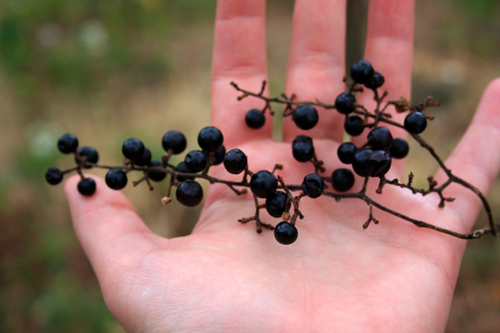
Wild grapes in hand, a tasty treat.
(*photo credit)
October 28, 2019 Fasting for Self AND Others
How can the guests at a wedding fast as long as the groom is still among them? (Mark 2: 18-22)
There are times to fast and times to celebrate. The first is more often overlooked, and yet fasting is part of most physical and religious disciplines. Fasting is regarded by some as an opportunity to give the stomach a rest, for we hear that fasting is good for physical health as well as the spirit.
Each year as we approach Thanksgiving Day, Oxfam encourages people to observe a fast for the world's poor, and to send the money saved to one or other world hunger projects. This consciousness-raising practice allows one to become aware of the amount and richness of the food consumed, how much our food differs from that of people in other ages and lands, and how little food more than a billion people of the world live on at any time. Fasting then takes on a different direction; we do it for learning to share with others.
Fasting is promoted for spiritual as much as for physical health and weight reduction. To refrain from eating is to say that good things can be taken in overabundance and thus can be harmful. Fasting is a way of accepting the human condition and realizing that we are tempted to overindulge -- and we are free to refrain from good things for the betterment of all including the control of our weight and our appetites. Fasting can be difficult. We know when we fast and have some hunger pangs, and for some of us this becomes a trying period. What is it all worth? The answer generally comes after the fasting period. Fasting becomes a coupling of the personal with the social dimension as we reflect on whether to initiate or to continue the fasting. Personal discipline and individual perfection become higher priorities.
A secondary social effect is hardly brought up, because people expect during fasting periods to do this without telling others. Maybe at times we could be inspired to talk about abstaining from meat or sweets or why we are drawn to fast. We live in a nation where many have never had to choose to say "no;" like spoiled children, we only need to stamp our feet and there's food. Upon deeper reflection we see meaning in fasting for others; such a social exercise becomes an act of love of God and neighbor. In an ideal way we could fast as a community knowing that God's bounty is given to all. We can't hide our testimony, but open it to help others, for fasting benefits the human community. Fasting, whether for individual or social purposes, goes counter to the prevailing culture of spend, consume, and grab for more. So speak up and fight the consumption craze by accepting fasting as a social good.
Prayer: Lord, help us see value in fasting at given times for the social as well as personal effects. Inspire us to promote the sense of forgoing good things for a greater social benefit.
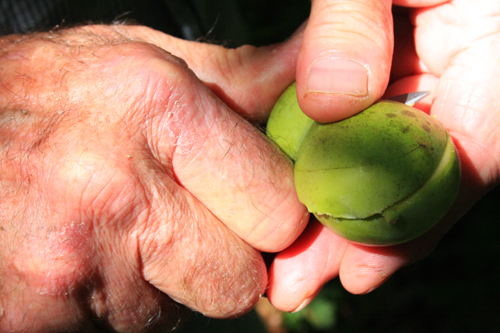
Cutting into ripened wild pawpaw fruit (Asimina triloba).
(*photo credit)
October 29, 2019 The Joy of Gardening
Gardening has its many good characteristics (physical exercise, psychic balance, household economy, environmental practice, and neighborhood development and enlightenment) and still among these benefits one includes spiritual aspects, including a place to pray and a natural presence that gives one pure joy. Yes, the joyful aspect is a mark of gardening that does not come early, for in the initial period gardening takes extra work to make a success. However, with time and a maturing process the garden affords the opportunity and locus for deeper reflection.
In part of accepting that I am a gardener comes the realization that some success can be achieved when acquiring the benefit of being closer to nature. This is difficult and almost impossible to explain to those who do not have closeness to the soil. Such a communion with the natural world gives us the experiential space to reflect on what is being achieved; we are able to see value in getting our hands dirty, and perhaps are closer to the child playing in the mud puddle than to the satisfied condition of a couch potato. In tilling earth we discover that to garden is to enjoy something: closeness to nature and the soil.
Is there a two-way communication with the plant world? It seems quite possible that enjoyment is shared by the plants that are growing. The so-called "green thumb" has a possibility of really existing in more than fantasy; plants respond to those who love and respect them. Some folks actually talk to their plants and then feel somewhat embarrassed if overheard. But should they? For the short time of their growth plants seem to sense that someone likes them and so their own expansiveness is magnified in lush growth and fulfillment. Surely plants know that the observer enjoys their presence and appearance. Thus the bounty is extended during this burst of growth and the observer's joy is magnified.
How do we express this experience of joy? If it cannot be communicated totally to ones who never work the soil, can it at least be presented as an option for them to experience? The testimony is that there's joy even when it is something that can't be easily translated. Joy is within one's being and is a total acceptance of gift, grace, presence and uplifting feeling, all combined into one in a perfect integral whole. It is expressed often non-verbally as a reality. Words are limited when spoken to the non-gardener. Here the community of gardeners understand.
You may or may not believe it. However, it may be worth your growth in spirit to open yourself to the possibility of gardening joy, whether with a few potted plants or a space for growing things. Is it even possible for one who does not have the experience of growing things to fathom what it means to see the work of your hands being formed into something living and thriving? Try it!
Prayer: Lord, thanks for the moments of consolation and inspire us to transmit our joy to others.
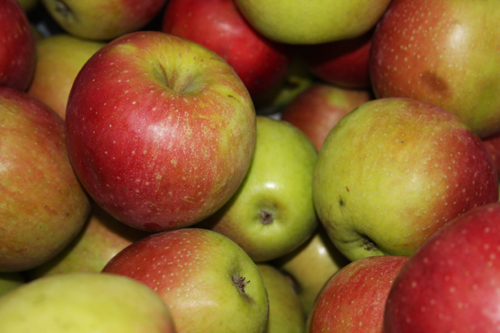
Freshly-picked crop of winesap apples.
(*photo credit)
October 30, 2019 Ways to Reduce or Avoid Food Wastes
Food supply experts tell us that, if American and European nations were to cut out their food wastes, there would be sufficient food left to feed the one billion people who go to bed hungry each night. It seems that wasting food in a world of food insecurity is a sin, and it causes some of us to be taken aback when others waste food. This frequent practice of wasting food could be avoided with some of the following suggestions:
1. Create a shopping list and don't buy more than you need over a given period;
2. Keep food stored in ways that keep it from spoiling in refrigerator or deep freeze, or free from mice;
3. Preserve all the food grown in the garden when blessed with excess;
4. Share excess with neighbors or with the local food bank or community kitchen;
5. Fix the approximate amount of food for the meal intended and ensure that the remainder is used for tomorrow's soup;
6. Add seasoning and spice to leftovers so that they create a new and appetizing dish;
7. Consider that excess food that expands the waistline is really wasted food;
8. Buy non-perishables in bulk, but beware that large purchases of perishables could result in unintended wastes;
9. Obtain limited samples of new foods for these may not be liked by residents in the household;
10. School food services could reduce waste by keeping portions smaller and encouraging students for more. When generous amounts are placed on plates, some think they are getting what the paid for. In one survey students wasted 40% of the served food;
11. Enhance the practice of larger meals earlier in the day and smaller ones later; people live longer when eating like a king at breakfast, prince at lunch and pauper at evening; and
12. Left over and outdated food in food markets and restaurants can be recycled to those in need with a little care and some regulatory changes at city, county and state levels.
Prayer: Lord, make us sensitive to the value of using the created bounty in our hands with proper respect, recalling that many would feast on what we regard as everyday fare.

Harvesting of research plots, University of Kentucky farm.
(*photo
credit)
October 31, 2019 Food Habits Change
Very few people will admit they eat the same throughout life. Nursing is replaced by solid food and this changes with that placed before us and then on through life when people leave home and acquire new tastes and habits. In fact, a history of change in eating habits would prove quite instructive for many of us.
Culinary circumstances. Amazingly, as we look back there are many variations in foods during any portion of life; attitudinal changes may be part of it, but just as likely the access to certain foods or cooking habits have much to do with who prepares the food we eat. Perhaps the greatest incentive for change is when the cook who furnishes meals is no longer able, due to our change of residence or the departure or distance from the cook.
Health demands. Perhaps of equal importance for many people is the change in health needs over time. A doctor says to the patient not to eat certain foods for the sake of his or her health. When accepted seriously, this caution becomes the reason for change in eating habits -- and that is all the more reason for even an abrupt transition. Along with personal health comes awareness that certain foods can be consumed in too high a quality, especially sugar, salt and fat components of the diet. General understanding of the need to change because overconsumption is harmful gives the eater pause as to both quantity and quality. Some opt for a dramatic change but soon fall back on past habits as to deserts or certain tempting dishes. Diets are hard to keep.
Economic changes. The purchase of certain foods changes our eating habits. Most would say it is the other way around, but really what we have acquired is the incentive for what we prepare and eat. Imperceptibly, we were all changing food habits. When I once looked back to a rare year two decades ago when I recorded all the food that I ate and compared that with my current diet, I found massive changes. If unrecorded it is more difficult to compare; in fact, I hardly know what I ate last week or yesterday. However, with time and later making my own food purchases, the cost and type of food became more a part of my awareness.
Pressure from others. Eating with others change our habits. Fast foods have become far more popular and result in eating habits that are harmful to an individual's health. The pressure may be to try something new or it may be a caution to refrain from some of the popular choices we make daily. With others who serve as self-appointed admonition partners, life can become more difficult until we realize that this is for our own benefit and better health. Habits change with social interaction and that is never so quickly admitted, but is true.
Prayer: Lord, give us a fuller understanding of our habits so that what we have work for our better health, which is itself a wonderful gift from you deserving of constant respect. |